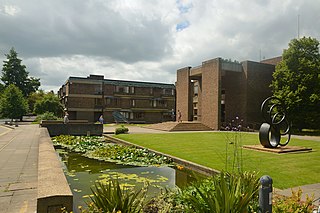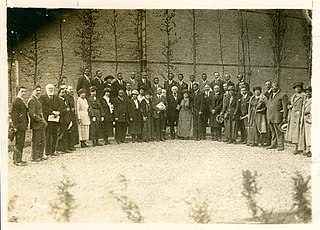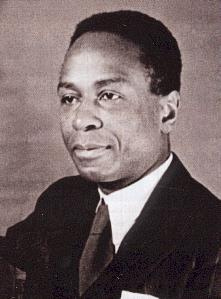Related Research Articles

Churchill College is a constituent college of the University of Cambridge in Cambridge, England. It has a primary focus on science, engineering and technology, but retains a strong interest in the arts and humanities.

The Pan-African Congress (PAC) is a regular series of meetings which first took place on the back of the Pan-African Conference held in London in 1900.

George Padmore, born Malcolm Ivan Meredith Nurse, was a leading Pan-Africanist, journalist, and author. He left his native Trinidad in 1924 to study medicine in the United States, where he also joined the Communist Party.

The Bengal Renaissance, also known as the Bengali Renaissance, was a cultural, social, intellectual, and artistic movement that took place in the Bengal region of the British Raj, from the late 18th century to the early 20th century. Historians have traced the beginnings of the movement to the victory of the British East India Company at the 1757 Battle of Plassey, as well as the works of reformer Raja Rammohan Roy, considered the "Father of the Indian Renaissance," born in 1772. Nitish Sengupta stated that the movement "can be said to have … ended with Rabindranath Tagore," Asia's first Nobel laureate.
Latin American studies (LAS) is an academic and research field associated with the study of Latin America. The interdisciplinary study is a subfield of area studies, and can be composed of numerous disciplines such as economics, sociology, history, international relations, political science, geography, cultural studies, gender studies, and literature.
Burton Stein was an American historian, whose area of specialization was India.

The historiography of the British Empire refers to the studies, sources, critical methods and interpretations used by scholars to develop a history of the British Empire. Historians and their ideas are the main focus here; specific lands and historical dates and episodes are covered in the article on the British Empire. Scholars have long studied the Empire, looking at the causes for its formation, its relations to the French and other empires, and the kinds of people who became imperialists or anti-imperialists, together with their mindsets. The history of the breakdown of the Empire has attracted scholars of the histories of the United States, the British Raj, and the African colonies. John Darwin (2013) identifies four imperial goals: colonising, civilising, converting, and commerce.

The Phelps Stokes Fund (PS) is a nonprofit fund established in 1911 by the will of New York philanthropist Caroline Phelps Stokes, a member of the Phelps Stokes family. Created as the Trustees of Phelps Stokes Fund, it connects emerging leaders and organizations in Africa and the Americas with resources to help them advance social and economic development.

Amiya Prosad Sen is a historian with an interest in the intellectual and cultural history of modern India. Currently he is Sivadasani Fellow at the Oxford Centre for Hindu Studies, Oxford (UK). He was previously the Heinrich Zimmer Chair at the South Asia Institute, Heidelberg University. He has served as Professor of Modern Indian History at Jamia Millia Islamia, New Delhi. He has been Agatha Harrison Fellow to the University of Oxford and Visiting Fellow to the Indian Institute of Advanced Study, Shimla, and the Centre for Contemporary Studies, Nehru Memorial Museum & Library, New Delhi. During 2007–08, he was Tagore professor at Vishwa Bharati, Shantiniketan.
The historiography of the United States refers to the studies, sources, critical methods and interpretations used by scholars to study the history of the United States. While history examines the interplay of events in the past, historiography examines the secondary sources written by historians as books and articles, evaluates the primary sources they use, and provides a critical examination of the methodology of historical study.
Richard Hart was a Jamaican historian, solicitor and politician. He was a founding member of the People's National Party (PNP) and one of the pioneers of Marxism in Jamaica. He played an important role in Jamaican politics in the years leading up to Independence in 1962. He subsequently was based in Guyana for two years, before relocating to London, England, in 1965, working as a solicitor and co-founding the campaigning organisation Caribbean Labour Solidarity in 1974. He went on to serve as attorney-general in Grenada under the People's Revolutionary Government in 1983. He spent the latter years of his life in the UK, where he died in Bristol.

The First Pan-African Conference was held in London, England, from 23 to 25 July 1900. Organized primarily by the Trinidadian barrister Henry Sylvester Williams, the conference took place in Westminster Town Hall and was attended by 37 delegates and about 10 other participants and observers from Africa, the West Indies, the US and the UK, including Samuel Coleridge-Taylor, John Alcindor, Benito Sylvain, Dadabhai Naoroji, John Archer, Henry Francis Downing, Anna H. Jones, Anna Julia Cooper, and W. E. B. Du Bois, with Bishop Alexander Walters of the AME Zion Church taking the chair.

James Desmond Buckle was a political activist, journalist, trade unionist and Communist born in the British colony of the Gold Coast. Described as "an African communist in Britain", he may have been the first African to join the British Communist Party.
Stella Jane Thomas was a Yoruba Nigerian lawyer of Sierra Leone Creole descent. She received a law degree from Oxford University and in 1943 became the first woman magistrate in Nigeria.
Marika Sherwood is a Hungarian-born historian, researcher, educator and author based in England. She is a co-founder of the Black and Asian Studies Association.
Ansel Keith David Wong is a Trinidadian-British cultural and political activist, who has been influential in many organisations particularly in the black community in the United Kingdom, where he has been based since the 1960s. He is the former Chair of the Notting Hill Carnival Board and founder of Elimu Mas Band. He is also an educationist and academic, and in a wide-ranging career has worked at senior levels in various organisations in the public and charitable sectors, including with the Windrush Foundation established in 1996 by Arthur Torrington.
The Black Power Movement in Montreal in the 1960s was a period of rediscovering black identity through a process of invoking cultural, economic, and political thought amongst blacks. The eruption of political activism during Montreal's Quiet Revolution as well as the reformation of immigration policies which discriminated against non-white immigrants allowed black communities to publicly express and bring awareness to their struggles with racism. The movement was an integral component of the emerging global challenges to imperialism during the 1960s, stemming from various movements including Garveyism, pan-Africanism, the Harlem Renaissance, Rastafari, and others. Montreal's Black Power movement culminated in the aftermath of the Sir George Williams Affair—a student occupation that resulted in an estimated $2 million worth of damages and 97 arrests—which raised concerns of racism worldwide.
Ivor Gustavus Cummings was a British civil servant of Sierra Leonean ancestry, in 1941 he became the first black official in the British Colonial Office. He has been dubbed the 'gay father of the Windrush generation'.

Cecil Belfield Clarke was a Barbadian-born physician who qualified in the United Kingdom and practised near the Elephant & Castle in London. He was a Pan-Africanist and was one of the founders of the League of Coloured Peoples in 1931.
Gerlin Bean is a Jamaican community worker who was active in the radical feminist and Black nationalist movements in the United Kingdom in the 1960s and 1970s. Trained as a nurse, she became a dedicated community activist and social worker, involved in the founding of the Black Women's Action Committee of the Black Unity and Freedom Party, the women's section of the Black Liberation Front, the Brixton Black Women's Group, and the Organisation of Women of African and Asian Descent (OWAAD). Bean's work and activism focused on eliminating discriminatory policies for people of colour, women, and people with disabilities. She fought for equal educational opportunity, fair wages, adequate housing, and programmes that supported families, such as counselling services, child care, and health care.
References
- ↑ "Subject Guide | Ansel Wong" (PDF). Black Cultural Archives. p. 3. Retrieved 6 December 2023.
- 1 2 3 Matera, Marc (April 2010). "Colonial Subjects: Black Intellectuals and the Development of Colonial Studies in Britain". Journal of British Studies. 49 (2): 416–417.
- ↑ Clover, David (2005). "Dispersed or destroyed: archives, the West Indian Students' Union, and public memory". Society for Caribbean Studies Annual Conference Papers, 6. ISSN 1471-2024.
- ↑ Thompson, Dudley (23 May 2009). "Reflections on Eugenia Charles - The Eugenia I knew". thedominican.net. Retrieved 6 December 2023.
- ↑ "Papers of Ansel Wong" held at Black Cultural Archives.
- ↑ "Interviewee: Ansel Wong", The GLC Story Oral History Project. Interviewer: Zahra Dalilah, Goldsmiths University, London, 16 February 2017.